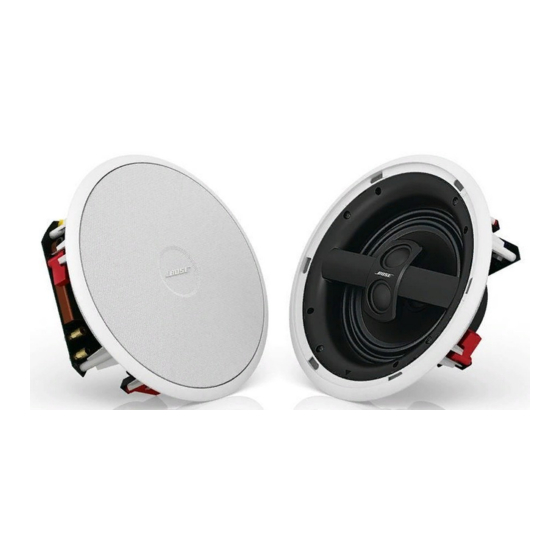Bose Virtually Invisible 791 Installatiehandleiding - Pagina 14
Blader online of download pdf Installatiehandleiding voor {categorie_naam} Bose Virtually Invisible 791. Bose Virtually Invisible 791 23 pagina's. Installation guide
Ook voor Bose Virtually Invisible 791: Installatiehandleiding (17 pagina's), Installatiehandleiding (35 pagina's)

REFERENCE
Using a spray technique
Latex or oil-based architectural paint requires thinning
for use with a siphon-feed spray gun. Set the spray
gun at 30 psi (2.1 bar) for application in a 3- to 5-in.
(7.6-12.7 cm) fan pattern.
The thinning formula depends on the type of paint you
are using.
• For use of vinyl acrylic latex paint, thin as follows:
To 6 parts of paint, add 3 parts of water and mix
thoroughly. Add 1 part of denatured ethyl alcohol
(which breaks down paint particles so they do not
clog the grille) and mix again.
• For use of architectural or automotive paints:
This type of paint should be used by a professional
with the right equipment and technique. This paint
also must be thinned, using a solvent.
• For use of lacquer or enamel spray paint in a can:
No further thinning is needed.
Then:
1.
Suspend the grille or place it on a wire screen to
prevent dirt or dried paint particles from blowing
back into the perforations.
2. Apply the paint to the grille surface at a 45° angle.
Then rotate the grille by 180° and repaint it at 45°.
3. Make sure the paint is dry before you attach the
grille to the speaker.
The paint may feel dry to the touch in a few minutes.
However, if alcohol has been added, it may take
several days to fully cure.
' - - -
Tip:
To dislodge
a
paint clog, blow gently on the
clogged area. If that does not work, immediately wash
the grille with the appropriate solvent. Make sure the
grille is thoroughly dry before repainting.
Piercing
a
perforation with
a
sharp implement to remove
a
paint clog can cosmetically damage the grille and is
not recommended.
12
Painting the frame
Before you begin, protect working parts of the speaker
by inserting the template/paint shield that came in the
carton.
Press the edges of the shield against the inside rim of
the speaker until the tabs catch to hold the shield in
place.
This protects working parts of the speaker and helps
keep your paint edge even.
You can use the same conventional spray or roller
equipment used to paint your wall or ceiling and either
latex or oil-based paints, which adhere to the speaker
frame. However, both types of paint can be easily
scratched through careless handling.
CAUTION: Be careful so the paint does not puddle or
run. You may want to use
a
brush for spreading paint
where needed.
REFERENCE
Using a spray technique
Latex or oil-based architectural paint requires thinning
for use with a siphon-feed spray gun. Set the spray
gun at 30 psi (2.1 bar) for application in a 3- to 5-in.
(7.6-12.7 cm) fan pattern.
The thinning formula depends on the type of paint you
are using.
• For use of vinyl acrylic latex paint, thin as follows:
To 6 parts of paint, add 3 parts of water and mix
thoroughly. Add 1 part of denatured ethyl alcohol
(which breaks down paint particles so they do not
clog the grille) and mix again.
• For use of architectural or automotive paints:
This type of paint should be used by a professional
with the right equipment and technique. This paint
also must be thinned, using a solvent.
• For use of lacquer or enamel spray paint in a can:
No further thinning is needed.
Then:
1.
Suspend the grille or place it on a wire screen to
prevent dirt or dried paint particles from blowing
back into the perforations.
2. Apply the paint to the grille surface at a 45° angle.
Then rotate the grille by 180° and repaint it at 45°.
3. Make sure the paint is dry before you attach the
grille to the speaker.
The paint may feel dry to the touch in a few minutes.
However, if alcohol has been added, it may take
several days to fully cure.
' - - -
Tip:
To dislodge
a
paint clog, blow gently on the
clogged area. If that does not work, immediately wash
the grille with the appropriate solvent. Make sure the
grille is thoroughly dry before repainting.
Piercing
a
perforation with
a
sharp implement to remove
a
paint clog can cosmetically damage the grille and is
not recommended.
12
Painting the frame
Before you begin, protect working parts of the speaker
by inserting the template/paint shield that came in the
carton.
Press the edges of the shield against the inside rim of
the speaker until the tabs catch to hold the shield in
place.
This protects working parts of the speaker and helps
keep your paint edge even.
You can use the same conventional spray or roller
equipment used to paint your wall or ceiling and either
latex or oil-based paints, which adhere to the speaker
frame. However, both types of paint can be easily
scratched through careless handling.
CAUTION: Be careful so the paint does not puddle or
run. You may want to use
a
brush for spreading paint
where needed.
